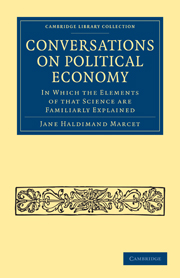Book contents
- Frontmatter
- PREFACE
- Contents
- CONVERSATION I INTRODUCTION
- CONVERSATION II INTRODUCTION—continued
- CONVERSATION III ON PROPERTY
- CONVERSATION IV PROPERTY—continued
- CONVERSATION V ON THE DIVISION OF LABOUR
- CONVERSATION VI ON CAPITAL
- CONVERSATION VII CAPITAL—continued
- CONVERSATION VIII ON WAGES AND POPULATION
- CONVERSATION IX WAGES AND POPULATION—continued
- CONVERSATION X ON THE CONDITION OF THE POOR
- CONVERSATION XI ON REVENUE
- CONVERSATION XII REVENUE FROM LANDED PROPERTY
- CONVERSATION XIII REVENUE FROM THE CULTIVATION OF LAND
- CONVERSATION XIV REVENUE FROM CAPITAL LENT
- CONVERSATION XV ON VALUE AND PRICE
- CONVERSATION XVI ON MONEY
- CONVERSATION XVII MONEY—continued
- CONVERSATION XVIII COMMERCE
- CONVERSATION XIX ON FOREIGN TRADE
- CONVERSATION XX FOREIGN TRADE—cont.
- CONVERSATION XXI ON EXPENDITURE
- INDEX
CONVERSATION XXI - ON EXPENDITURE
Published online by Cambridge University Press: 07 September 2011
- Frontmatter
- PREFACE
- Contents
- CONVERSATION I INTRODUCTION
- CONVERSATION II INTRODUCTION—continued
- CONVERSATION III ON PROPERTY
- CONVERSATION IV PROPERTY—continued
- CONVERSATION V ON THE DIVISION OF LABOUR
- CONVERSATION VI ON CAPITAL
- CONVERSATION VII CAPITAL—continued
- CONVERSATION VIII ON WAGES AND POPULATION
- CONVERSATION IX WAGES AND POPULATION—continued
- CONVERSATION X ON THE CONDITION OF THE POOR
- CONVERSATION XI ON REVENUE
- CONVERSATION XII REVENUE FROM LANDED PROPERTY
- CONVERSATION XIII REVENUE FROM THE CULTIVATION OF LAND
- CONVERSATION XIV REVENUE FROM CAPITAL LENT
- CONVERSATION XV ON VALUE AND PRICE
- CONVERSATION XVI ON MONEY
- CONVERSATION XVII MONEY—continued
- CONVERSATION XVIII COMMERCE
- CONVERSATION XIX ON FOREIGN TRADE
- CONVERSATION XX FOREIGN TRADE—cont.
- CONVERSATION XXI ON EXPENDITURE
- INDEX
Summary
MRS. B
I TRUST that you now understand both the manner in which capital is accumulated, and the various modes of employing it to produce a revenue. It remains for us to examine how this revenue may be disposed of.
CAROLINE
I have already learnt that revenue may either be spent, or accumulated and converted into capital; and that the more a man economises for the latter purpose, the richer he becomes.
MRS. B
This observation is equally applicable to the capital of a country, which may be augmented by industry and frugality, or diminished by prodigality.
CAROLINE
The capital of a country, I think you said, consisted of the capital of its inhabitants taken collectively?
MRS. B
It does; but you must be careful not to estimate the revenue of a country in the same manner, for it would lead to very erroneous calculations. Let us for instance suppose my income to be 10,000l. a-year, and that I pay 500l. a-year for the rent of my house—it is plain that this 500l. constitutes a portion of the income of my landlord; and since therefore the same property, by being transferred from one to another, may successively form the income of several individuals, the revenue of the country cannot be estimated by the aggregate income of the people.
CAROLINE
And does not the same reasoning apply to the expenditure of a country; since the 500l. a-year which you spend in house-rent will be afterwards spent by your landlord in some other manner?
- Type
- Chapter
- Information
- Conversations on Political EconomyIn Which the Elements of that Science are Familiarly Explained, pp. 419 - 450Publisher: Cambridge University PressPrint publication year: 2010First published in: 1816



